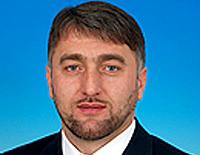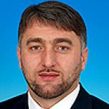
Kadyrov and Co. Leap to Delimkhanov’s Defense
Publication: North Caucasus Weekly Volume: 10 Issue: 14
By:

Officials of Chechnya’s pro-Moscow administration this week denounced authorities in the United Arab Emirates for accusing Adam Delimkhanov, the Russian State Duma deputy and first cousin of Chechen President Ramzan Kadyrov who is also the republic’s deputy prime minister, of being behind the murder in Dubai of Sulim Yamadaev.
Delimkhanov himself told Interfax on April 5—the same day the chief of Dubai’s police, Lieutenant General Dahi Khalfan Tamim, accused him of masterminding Yamadaev’s assassination—he was ready to cooperate with the investigation and answer questions from the Dubai police “if they are based on objective information and not guesswork.” Yet, Delimkhanov called Tamim’s accusations against him a “provocation” aimed at destabilizing Chechnya, claiming they were “made to order” and not based on “objective” information.
Delimkhanov noted the theory that Yamadaev may have been assassinated in revenge for the Vostok battalion’s raid in Chechnya’s Vedeno district in 2004 that killed Abu al-Walid, the Arab field commander and alleged al-Qaeda representative fighting in Chechnya, for which Yamadaev received the Hero of Russia medal. Delimkhanov suggested a possible “Saudi connection” to Yamadaev’s murder in revenge for Abu al-Walid’s elimination and accused the Dubai police of not looking for the true culprits, thereby demonstrating “incompetence, inability and unwillingness to detain those guilty.” The Dubai police chief’s statements made it clear “where murderers and kidnappers found refuge” and who was shielding them, Delimkhanov added. Interfax separately quoted Delimkhanov as saying Yamadaev had enemies in various parts of the world, from the Chechen village Borozdinovskaya to the Middle East, “whose citizens he killed during military operations in the Chechen mountains.” Borozdinovskaya is the village in which Yamadaev’s Vostok battalion carried out a security sweep in June 2005, during which 11 villagers disappeared, homes were burned and an elderly man was reportedly burned alive. Yamadaev has denied that Vostok members were involved in the raid.
It should be noted that during his April 5 press conference, Dubai police chief Tamim explicitly rejected speculation that Yamadaev was killed by Arab Islamists.
Newsru.com on April 7 quoted Delimkhanov as saying he is considering suing Dubai’s police chief, Lieutenant General Dahi Khalfan Tamim. “My lawyers are analyzing the statements of the Dubai chief of police, studying the laws of the United Arab Emirates and are preparing to sue him to protect my honor and dignity as a [Russian] citizen and State Duma deputy,” he told Itar-Tass, noting that he may seek the assistance of the “most authoritative and serious lawyers’ offices in the Middle East.” Delimkhanov added: “Besides that, we plan through the courts to explain the reasons why the [UAE] law-enforcement bodies sheltered a criminal guilty of the death of hundreds of people in Chechnya and other regions of the Russian Federation. While sheltering Yamadaev, who was on the federal wanted list, they did not warn Russia that a criminal whose guilt was convincingly proved in his homeland is located on their territory.”
Delimkhanov repeated his claim that the UAE authorities’ investigation of Yamadaev’s murder is being carried out “extremely strangely and in a biased way.” He added: “I believe that there are forces abroad, including in the Middle East, [which are] systematically and provocatively loosening Russia’s position in the world and in the Caucasus. The recent events in South Ossetia are links in the same chain. Those forces hardly like what is going on in Chechnya, in the south of Russia, the strengthening of the position of the state and the practical victory over extremism and terrorism in Chechnya. Now their goal is to smear the leadership of Chechnya, to hang on it the sequence of incomprehensible crimes that have been stage-managed by someone—murders, provocations [and] attacks, from Vienna to Dubai. They don’t like the fact that Chechnya has become peaceful and Russia has become powerful, including in the Caucasus.”
In an interview with Gazeta.ru published on April 8, Delimkhanov said he was not sure Sulim Yamadaev was actually dead, appearing to give credence to repeated claims by Yamadaev’s brother Isa that he is still alive [the latest such claim by Isa was made on April 9] and to Russian reports that Sulim Yamadaev was alive and in the UAE authorities’ witness protection program. Delimkhanov implied that the United States was controlling events in the UAE. He told the website he had just returned from Syria, where he had been “teaching students to follow the precepts of Islam.”
Delimkhanov told Interfax on April 9 that he plans to demand “compensation for the moral and material damage” suffered by Russian citizens detained in connection with the probe into Yamadaev’s murder and that he has not ruled out suing the Dubai police. He called the accusations of his alleged involvement in the murder “provocative” and said that Dubai police chief Tamim “must have been advised” to level the charges by “overseas” forces that do not like “normalization and stability in southern Russia.” Asked if he meant Western security services, Delimkhanov replied, “One hundred percent.” He said Yamadaev may have been murdered by one of his “many personal enemies,” who, he said, were searching for Yamadaev “in Arab countries.”
The Dubai police chief’s accusations against Delimkhanov have been denounced by other Chechen officials. The Moscow Times reported on April 6 that Chechnya’s representative in the Federation Council, Ziyad Sabsabi, was quoted by Itar-Tass as saying that the allegations against Delimkhanov were “provocative and deceptive” and “aimed at destabilizing the situation inside Chechnya and in the south of Russia.” Nurdi Nukhazhiev, Chechnya’s human rights ombudsman, described the allegations as “baseless and illegal,” UAE’s The National reported on April 7. “I have personally known Delimkhanov for a long time and for that reason I consider the accusations thrown at him as provocations,” Nukhazhiev told Interfax. Delimkhanov’s name “was not brought up coincidentally,” he said. “He is a State Duma deputy from United Russia, an adviser to the Chechen president and one of the key political figures in the Chechen Republic,” Nukhazhiev said. “The main thing is that this is an indirect strike aimed against Ramzan Kadyrov and all Russian policies in the Caucasus and in the East.”
On April 6, Chechen President Ramzan Kadyrov came out in defense of Delimkhanov and one of the two suspects arrest in Dubai in connection with Yamadaev’s murder, the Moscow Times reported on April 7. In a statement posted on the Chechen president’s website, Kadyrov described Delimkhanov as “my close adviser, friend, brother and, moreover, my right-hand man,” adding that any statements “directed toward him I understand as directed against myself” and that he would seek to hold accountable “those who disseminate such libelous fabrications.” Kadyrov said in his statement that the Iranian man arrested by Dubai police, Mahdi Lournia, was in fact a caretaker for his racehorses in the UAE and that at the time of Yamadaev’s murder, Lournia was at a horse race and repeatedly spoke with him by telephone from the racetrack. “My horse took fifth place,” the Moscow Times quoted Kadyrov as saying in his statement.
In addition, Kadyrov told RIA Novosti he was “70 percent” certain that Sulim Yamadaev had played a role in the assassination of his father, Chechen President Akhmad Kadyrov, who was killed in a bomb blast at Grozny’s Dinamo Stadium on May 9, 2004. According to the Moscow Times, Kadyrov also claimed that Yamadaev plotted to kill him on the day he was inaugurated as Chechnya’s president, February 15, 2007, by poisoning a lake at his residence, adding that he had a “witness” to this claim. Kadyrov denounced Yamadaev as a “criminal” who “mercilessly spilled the blood of peaceful citizens, deeply religious Muslims, and systematically carried out the kidnapping of people with the goal of extorting large sums of money from them.”
An unnamed member of the Yamadaev clan called Kadyrov’s claim that Sulim Yamadaev was involved in the murder of Kadyrov’s father “total lunacy and absurd,” Kavkazky Uzel reported on April 6. Ruslan and Sulim Yamadaev were the first to support Akhmad Kadyrov in his fight against “the Wahhabis,” the anonymous Yamadaev relative told the website. “Akhmad-khadzhi [Kadyrov] called Sulim his son, and Ramzan [at that time] called him a brother," the relative said. "Therefore, to say that Sulim was in some way involved in the terrorist act against Akhmad-khadzhi is a lie. He would never have done that, inasmuch as he very much loved and honored Kadyrov Senior.”
Meanwhile, Andrei Lugovoi, the State Duma deputy accused by Britain in the 2006 radioactive poisoning murder of former Federal Security Service (FSB) officer Aleksandr Litvinenko, told Interfax on April 6 that the Dubai police was playing “political games” in accusing Delimkhanov of being behind Yamadaev’s murder, adding that their actions reminded him of Scotland Yard’s actions in the Litvinenko case. Lugovoi said the Dubai police should “present strong and real evidence of Mr. Delimkhanov’s involvement in this case, and not unsubstantiated versions,” adding that the accusations against Delimkhanov should not “grow into anti-Russian hysteria” or “impact the development of bilateral relations.” RIA Novosti on April 6 quoted Lugovoi as saying Delimkhanov was prepared to cooperate with Dubai police as long as the probe was not politicized “like the Litvinenko case.”
Kavkazky Uzel wrote on April 6 that in addition to being known in Chechnya as a politician, Delimkhanov is also known for having worked as the driver of separatist field commander Salman Raduev and subsequently as the commander of the pro-Moscow Chechen administration’s so-called “oil regiment,” whose members, like the members of Sulim Yamadaev’s Vostok battalion, were involved in kidnapping, torture and the murder of suspected rebels’ relatives. The website noted that Delimkhanov is believed to have been involved in the assassination of Movladi Baisarov, head of the Gorets special unit of the FSB, who was shot to death in the center of Moscow in the fall of 2006. Indeed, Sulim Yamadaev told the newspaper Novaya Gazeta last November that Delimkhanov murdered Baisarov (North Caucasus Weekly, April 3; Chechnya Weekly, November 22, 2006).
Newsru.com reported on April 5 that in 2005, Dokka Umarov, now the leader of the radical wing of the armed Chechen resistance, accused Delimkhanov’s minions of kidnapping his wife and six-month old child, his 70-year-old father and his 45-year-old brother. Umarov also accused Delimkhanov’s associates of kidnapping and murdering several relatives of Abdul-Vakhab Khusainov, a minister in the separatist Chechen Republic of Ichkeria (ChRI) government.




